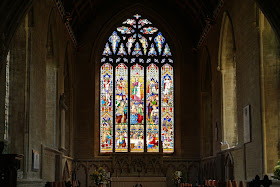Church of St Peter and Paul
Another walk in the series that Merv and I are doing of southern towns. Previous ones include Ledbury, Banbury and Tewkesbury. It is a bit surprising to be north of Milton Keynes and still be in the South East and to think that Olney is is in tame county as Eton - I guess they are the most northerly and southerly points.
Guided by a town trail, we started at the southern edge of the town and headed into the churchyard of St Pete and Paul. The tall 14th century spire would turn out to be visible for miles around. The church is basically 14th century with 19th century restoration by Sir George Gilbert Scott. I did rather like the colourful Victorian stained glass in the east window.
John Newton, the curate between 1764 and 1780 and the poet William Cowper wrote the Olney Hymns which include the celebrated "Amazing Grace".
Following the town trail we headed through the cemetery and curved round to enter the triangular Market Place, where on the left is the Cowper and Newton Museum. Cowper lived there with his "companion" Mary Unwin. The building dates from about 1700.
We walked up the wide side street and Pevsner points out the feature which makes it so distinctive: there are no side streets. The building are also reasonably uniform in age and size and there are lots of trees.
On the right we noted the Bucks Lace Industry building, now a private house: "an ugly but interesting building of 1928" (Pevsner). Lace making was an important cottage industry in Olney in the past.
On the left was The Picture House, presumably the former cinema.
Further up on the left was the fantastic Orchard House (1904). Pevsner describes it as Arts and Crafts Neo-Baroque. I see it as an example of English art nouveau, albeit maybe not the finest.
Here is a bit more detail of the flower motifs and the stained glass.
At the end of the High St is, rather surprisingly, Town Farm (early 18th century) - which still has farm buildings, looking bit derelict, behind it.
We now retraced our steps and continued down the long High St almost to the church. We noted the how well maintained the buildings, the number of small local shops and businesses (and the absence of empty shoes or ones used as Charity shops), and the relatively small number of national chains.
On the right thee was a very fine terrace of double fronted houses - not that common.
We passed to the side of the church and reached the bank of the Great Ouse at Mill House and were immediately walking across open grassland.
Soon we reached a point where the river turned north and we crossed a small bridge to continue on to
Clifton Reynes. There was a nice view back, reminiscent I thought of Constable's painting of Salisbury Cathedral.
There was a lovely view along the river too.
Clifton Reynes is only a hamlet but it has a striking church Norman tower and 13th-14th century battlements and a pub which served us a very nice lunch from a surprisingly long menu.
We now navigated our way across a large grassy expanse to reach a road just near Emberton. There was another nice view of the river, meadows and church spire.
We crossed the A509 and entered the village to see a simple neo-Gothic clock tower in the middle of the road. It was erected in 1846 by the then vicar in memory of his late wife.
Further along the same road we came to the church of All Saints, a very pleasing building of the early 14th century.
The road ended with a small council estate (but it looked as though the right to buy had been widely exercised) and then across field paths to enter Emberton Country Park, a very nicely done repurposing of some disused gravel pits.
We were pleased to spot a heron as we meanderd through the park to emerge on the A507 a short was south of where we had parked.
Conditions: quite warm. We were pleased that we managed to avoid some passing showers.
Distance: about 7.5 miles.
Map: Explorer 207 (Newport Pagnell and Northampton South).
Rating: three and a half stars.


















Lovely! Your blog reminds me of my cousin John's blog By Stargoose and Hanglands. He posts mainly about the area around Cambridge and East Anglia. I'm popping in from West Virginia, in the USA.
ReplyDelete